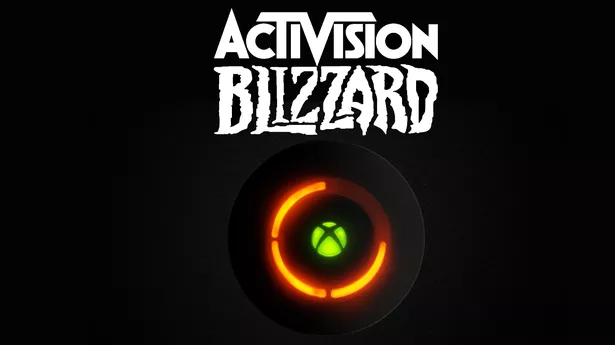FTC To Appeal Microsoft-Activision Deal: What Happens Next?

Table of Contents
The FTC's Arguments for Appeal
The FTC's core concern centers on the potential for anti-competitive practices stemming from the Microsoft-Activision merger. They believe the deal would significantly reduce competition in the video game market, potentially harming consumers. The FTC's arguments hinge on several key points:
-
Anti-competitive practices: The FTC argues that Microsoft's acquisition of Activision Blizzard, a major game publisher, would give Microsoft an unfair advantage, allowing them to suppress competition and potentially manipulate game pricing. This relates to broader antitrust concerns within the gaming industry.
-
Concerns about Call of Duty exclusivity: A significant point of contention revolves around Call of Duty, one of the world's most popular game franchises. The FTC fears that Microsoft could make Call of Duty exclusive to its Xbox ecosystem, harming competitors like PlayStation and potentially limiting consumer choice. This fear centers on the impact on market share and the competitive landscape.
-
Impact on game subscription services: The FTC also expresses concern about the impact on the growing market for game subscription services like Xbox Game Pass. They argue the merger could allow Microsoft to leverage Activision Blizzard's titles to solidify its dominance in this sector, thereby hindering the growth of rival subscription services. This ties into worries about market dominance and reduced consumer options.
-
Market dominance fears: The overarching concern is that the merger would grant Microsoft excessive market power, allowing them to dictate terms to developers, publishers, and ultimately, consumers. This could stifle innovation and lead to higher prices for gamers. This raises fundamental questions about the gaming industry's competitive structure and regulatory hurdles.
Microsoft's Response and Next Steps
Microsoft vehemently denies the FTC's claims, arguing the merger will benefit consumers and increase competition. Their defense strategy focuses on several key points:
-
Microsoft's commitment to keeping Call of Duty on PlayStation: Microsoft has repeatedly pledged to keep Call of Duty available on PlayStation, emphasizing its commitment to maintaining competition and consumer choice. This commitment forms a central plank of their counterarguments.
-
Arguments against the FTC's claims of anti-competitive behavior: Microsoft argues the FTC's assessment of the market is flawed and that the merger will not lead to the significant anti-competitive effects predicted by the commission. They present their own market analysis to support this claim.
-
Potential legal strategies to combat the appeal: Microsoft's legal team will employ various strategies to challenge the FTC's appeal, likely including presenting further evidence and expert testimony to refute the commission's concerns. This includes addressing the regulatory hurdles involved in the acquisition.
-
Microsoft's broader gaming strategy post-acquisition: Microsoft's overall post-acquisition strategy will likely play a significant role in their defense. They will emphasize their commitment to continued investment in game development and their broader plans for growth within the gaming industry. This demonstrates their commitment to competing in the gaming console competition.
The Appeal Process: Timeline and Potential Outcomes
The appeal process will likely involve a lengthy legal battle. The case will be heard by a higher court, and the timeline for a final decision remains uncertain. Several potential outcomes are possible:
-
Possible delays in the deal’s closure: The appeal will undoubtedly delay the closing of the Microsoft-Activision Blizzard deal, potentially for months or even years. This uncertainty affects both companies and the overall gaming market.
-
Likelihood of success for either side: Predicting the outcome is difficult, given the complexities of the legal arguments and the precedent set by previous antitrust cases. The success of either side depends on the court's interpretation of relevant antitrust laws and its assessment of the presented evidence.
-
Potential for settlement negotiations: There is a possibility that Microsoft and the FTC could engage in settlement negotiations to avoid a protracted legal battle. This involves finding a compromise that addresses the FTC's concerns while allowing the merger to proceed, albeit potentially with conditions attached.
-
Impact on the share prices of Microsoft and Activision Blizzard: The ongoing uncertainty surrounding the appeal is likely to continue impacting the share prices of both Microsoft and Activision Blizzard. The outcome of the appeal will have a significant influence on their respective stock valuations.
Impact on the Gaming Industry
The FTC's appeal of the Microsoft-Activision deal carries far-reaching implications for the gaming industry:
-
Precedent set for future antitrust cases in the gaming industry: The outcome of this appeal will establish a crucial precedent for future mergers and acquisitions within the gaming sector, influencing how regulators approach similar deals in the future.
-
Impact on consumer choice and prices: The case directly impacts consumer choice and the potential for increased game prices. The argument centers on the potential for reduced competition leading to either diminished options or inflated costs for gamers.
-
Effects on game development and distribution: The legal battle and its outcome have the potential to significantly impact the future of game development and distribution, possibly shaping the dynamics of the entire gaming ecosystem.
FTC to Appeal Microsoft-Activision Deal: What Lies Ahead?
In summary, the FTC's appeal of the Microsoft-Activision deal represents a significant legal challenge with profound implications for the future of the gaming industry. The FTC's concerns about anti-competitive practices, specifically regarding Call of Duty exclusivity and market dominance, are countered by Microsoft's commitment to maintain platform availability and its arguments against the FTC's assessment. The appeal process itself is fraught with uncertainty, with potential delays, varying outcomes, and the ever-present possibility of settlement negotiations. This legal battle will set a crucial precedent for future mergers and acquisitions in the gaming sector, impacting consumer choice, game pricing, and overall industry innovation.
Keep an eye on this developing story! We will continue to provide updates on the FTC’s appeal of the Microsoft-Activision deal as the situation unfolds.

Featured Posts
-
 Monaco Gp Fp 1 Leclerc Leads Verstappen In Pursuit
May 26, 2025
Monaco Gp Fp 1 Leclerc Leads Verstappen In Pursuit
May 26, 2025 -
 Rio Tinto Addresses Environmental Concerns In Australias Pilbara Region
May 26, 2025
Rio Tinto Addresses Environmental Concerns In Australias Pilbara Region
May 26, 2025 -
 Jadwal Siaran Langsung Sprint Race Moto Gp Inggris Di Trans7 Rins Vs Marquez
May 26, 2025
Jadwal Siaran Langsung Sprint Race Moto Gp Inggris Di Trans7 Rins Vs Marquez
May 26, 2025 -
 Jenson Fw 22 Extended Design Inspiration And Creative Process
May 26, 2025
Jenson Fw 22 Extended Design Inspiration And Creative Process
May 26, 2025 -
 Anciens Locaux Rtbf A Liege Reamenagement Et Projets Futurs
May 26, 2025
Anciens Locaux Rtbf A Liege Reamenagement Et Projets Futurs
May 26, 2025
